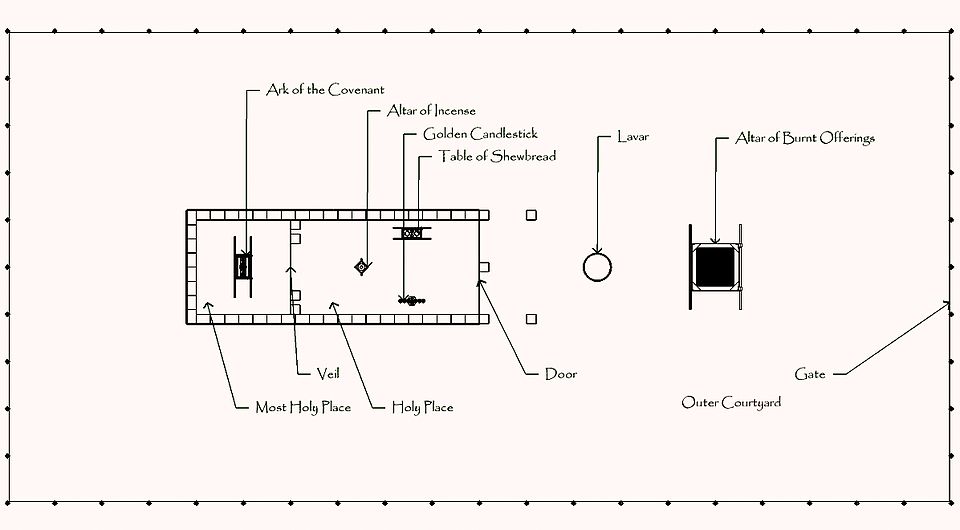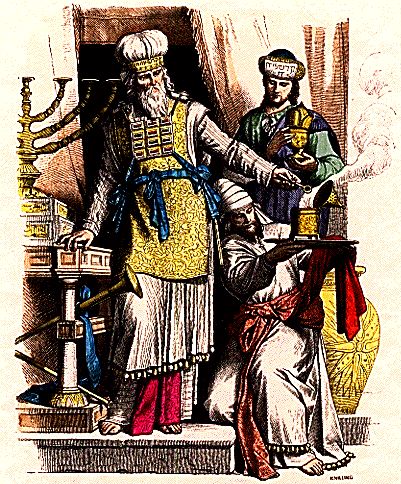Difference between revisions of "AY Honors/Sanctuary/Answer Key"
m (grammar) |
(add illustration) |
||
| Line 101: | Line 101: | ||
=== b. The high priest. === | === b. The high priest. === | ||
| + | [[File:PLATE4DX.jpg|thumb|400px|Jewish High Priest wearing the sacred vestments. The ephod is depicted here in yellow.]] | ||
Like all priests, the high priest wore linen breeches as an undergarment. The garments were woven of one piece, spotless, without any blemish. Over the undergarment, he wore an embroidered linen coat, again woven of one piece of fabric. The coat was tied with an embroidered girdle. Over this the High Priest wore a one-piece sleeveless solid blue robe. On the hem of the blue robe hung tinkling little golden bells and bright pomegranates. | Like all priests, the high priest wore linen breeches as an undergarment. The garments were woven of one piece, spotless, without any blemish. Over the undergarment, he wore an embroidered linen coat, again woven of one piece of fabric. The coat was tied with an embroidered girdle. Over this the High Priest wore a one-piece sleeveless solid blue robe. On the hem of the blue robe hung tinkling little golden bells and bright pomegranates. | ||
| Line 109: | Line 110: | ||
He wore a mitre (a crown) on his head. Fastened to the forefront of it with a ribbon of blue, was a plate of pure gold on which was engraved the inscription 'HOLINESS TO THE LORD' | He wore a mitre (a crown) on his head. Fastened to the forefront of it with a ribbon of blue, was a plate of pure gold on which was engraved the inscription 'HOLINESS TO THE LORD' | ||
[http://www.biblegateway.com/passage/?search=Exodus%2028; (Exodus 28 and 39)] | [http://www.biblegateway.com/passage/?search=Exodus%2028; (Exodus 28 and 39)] | ||
| + | {{clear}} | ||
== 8. Read and discuss The Great Controversy page 488 and Hebrews 4:14-16. == | == 8. Read and discuss The Great Controversy page 488 and Hebrews 4:14-16. == | ||
Revision as of 02:28, 30 July 2011
1. Name the three main parts of the sanctuary and the court yard.
The three main parts of the sanctuary and courtyard were the court, the Holy Place and the Most Holy Place.
a. Tell what was in each part.
- The Court: The Altar of Sacrifice, the Laver
- Holy Place: Table of Shewbread, Seven-branched Lampstand, Altar of Incense
- Most Holy Place: - Ark of Covenant, Mercy Seat, Cherubim
b. Tell what each piece of furniture represents.
- Altar of Sacrifice: Jesus's sacrifice
- Laver: Cleansing from sin, form of Baptism
- Table of Shewbread: Jesus, Bread of Life
- Seven-branched Lampstand: Jesus, Light of the world (Oil=Holy Spirit)
- Altar of Incense: Prayers ascending to Heaven, intercession & merits of Christ
- Ark of Covenant: The presence of God (10 Commandments)
- Mercy Seat: Meeting Place
- Cherubim: God's attributes
2. Draw a scale model of the sanctuary, the court yard and the position of all the furnishings. (Remember to add N, S, E, W)
North is to the top.
3. How many coverings were over the sanctuary?
The Sanctuary was covered with four layers as described below.
a. List the type of coverings in the order from inside to outside.
- Inner royal liner: Covering was made of red, blue, purple linens. Angels were embroidered in gold throughout the fabric
- Goat's hair: bleached white
- Ram's skin: dyed red
- Badger's skin: plain and brown
b. Tell what each covering represented.
- Inner royal liner represents Jesus. Red represents Christ's life. Blue represents His obedience. Purple represents royalty. Gold represents purity.
- Woven goat's hair represents Jesus's perfection and purity.
- The ram's skin dyed red represents the blood of Jesus.
- The badger's skin represents Jesus covering His divinity with humanity.
4. The following colors were used in the sanctuary and in the priests clothing. Tell what each color represented.
a. Red: Christ's blood (Hebrews 9:11,12)
b. Blue: Obedience (Numbers 15:38,39)
c. Purple: Royalty (Mark 15:16-18)
d. White: Righteousness, Purity (Revelation 19:8)
e. Black: Sin (1 John 1:5)
f. Gold: Divinity in Heaven (Job 22:25)
g. Silver: Longing Desire - the Hebrew word for yearn (kāsap) shares a root with the Hebrew word for silver (kesap).
h. Brass: Divinity on Earth (Philippians 2:5-8 - Fully God, and Fully Man - Amalgamated)
5. Discuss and memorize 1 John 1:9, Daniel 8:14, and Exodus 25:8.
If we confess our sins, he is faithful and just to forgive us our sins, and to cleanse us from all unrighteousness.
And he said unto me, Unto two thousand and three hundred days; then shall the sanctuary be cleansed.
And let them make me a sanctuary; that I may dwell among them.
6. The priests were from which of the 12 tribes? Why?
They were from the tribe of Levi. They had refused to bow down and worship the golden calf.
Moses saw that the people were running wild and that Aaron had let them get out of control and so become a laughingstock to their enemies. So he stood at the entrance to the camp and said, “Whoever is for the LORD, come to me.” And all the Levites rallied to him. Then he said to them, “This is what the LORD, the God of Israel, says: ‘Each man strap a sword to his side. Go back and forth through the camp from one end to the other, each killing his brother and friend and neighbor.’” The Levites did as Moses commanded, and that day about three thousand of the people died. Then Moses said, “You have been set apart to the LORD today, for you were against your own sons and brothers, and he has blessed you this day.”
7. Describe the robe of:
a. The common priest.
The priests wore linen breeches as an undergarment. The garments were woven of one piece, spotless, and without any blemish. All the common priests wore a plain, white linen robe and turban. They always removed their sandals before entering the Sanctuary. (Exodus 28 and 39)
b. The high priest.
Like all priests, the high priest wore linen breeches as an undergarment. The garments were woven of one piece, spotless, without any blemish. Over the undergarment, he wore an embroidered linen coat, again woven of one piece of fabric. The coat was tied with an embroidered girdle. Over this the High Priest wore a one-piece sleeveless solid blue robe. On the hem of the blue robe hung tinkling little golden bells and bright pomegranates.
The ephod, was worn outside the blue robe - a shorter garment of gold, blue, purple and scarlet, and fine twined linen. The ephod was fastened at the shoulders with two onyx stones, on each were engraved the names of six of the tribes of Israel. On the ephod the High Priest wore a breastplate made of two pieces of fabric fastened together. In the breastplate, next to the heart of the High Priest, were two onyx stones called the Urim and the Thummim, through which God made known His will.
On the outside of the breastplate were 12 precious stones. They were arranged as four rows of three. Their sequence, from left to right and from top to bottom were: sardis (brownish red), topaz (yellow to yellowish red), carbuncle (red), emerald (clear green), sapphire (deep blue), diamond (sparkling clear), jacinth (bright yellow), agate (delicate blue), amethyst (violet), beryl (green-yellow), onyx (bright yellow), jasper (red, brown, or yellow).
He wore a mitre (a crown) on his head. Fastened to the forefront of it with a ribbon of blue, was a plate of pure gold on which was engraved the inscription 'HOLINESS TO THE LORD' (Exodus 28 and 39)
8. Read and discuss The Great Controversy page 488 and Hebrews 4:14-16.
- The Great Controversy
- "The subject of the sanctuary and the investigative judgment should be clearly understood by the people of God. All need a knowledge for themselves of the position and work of their great High Priest. Otherwise it will be impossible for them to exercise the faith which is essential at this time or to occupy the position which God designs them to fill. Every individuals has a soul to save or to lose. Each has a case pending at the bar of God. Each must meet the great Judge face to face. How important, then that every mind contemplate often the solemn scene when the judgment shall sit and the books shall be opened, when, with Daniel, every individual must stand in his lot, at the end of days.
All who have received the light upon these subjects are to bear testimony of the great truths which God has committed to them. The sanctuary in heaven is the very center of Christ's work in behalf of men. It concerns every soul living upon the earth. It opens to view the plan of redemption, bringing us down to the very close of time and revealing the triumphant issue of the contest between righteousness and sin. It is of the utmost importance that all should thoroughly investigate these subjects and be able to give an answer to everyone that asketh them a reason of the hope that is in them."
14Therefore, since we have a great high priest who has gone through the heavens,Jesus the Son of God, let us hold firmly to the faith we profess. 15For we do not have a high priest who is unable to sympathize with our weaknesses, but we have one who has been tempted in every way, just as we are—yet was without sin. 16Let us then approach the throne of grace with confidence, so that we may receive mercy and find grace to help us in our time of need."
9. What kinds of animals were brought daily to the courtyard?
A young bull, rams, heifers, lambs, goats, and pigeons or doves were brought to the sanctuary daily. All were ceremonially clean, without spot or blemish (John 1:29)


